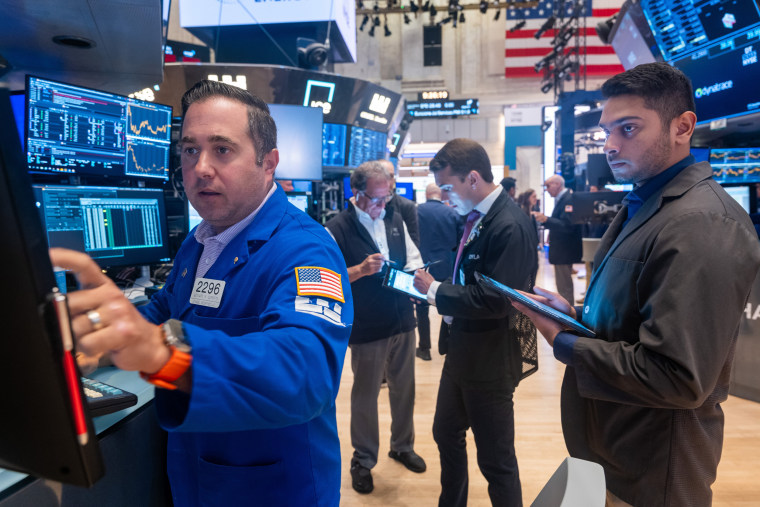Why Argentina’s military is deploying to surveil hundreds of Chinese fishing boats off its coast
U.S. markets close sharply lower — but some economists say economy looks stable


Stocks saw a dramatic pullback — their third in as many trading days — as a confluence of factors including ongoing fears of an economic slowdown and repositioning on Wall Street sent shares tumbling.
The Dow Jones Industrial Average dropped 1,034 points, or 2.6%. The Nasdaq Composite lost 3.4%, and the S&P 500 slid 3%. The blue-chip Dow and S&P 500 were on track for their biggest daily losses since September 2022.
The rout on Monday was sparked by a massive sell-off in Japanese stocks. The benchmark Nikkei 225 index fell 12.4%, its worst day since the 1987 ‘Black Monday’ crash rattled investors around the world.
Japan and other Asia-Pacific markets appeared to recover on Tuesday, however, with the Nikkei rebounding as much as 10%.
Traders work on the floor of the New York Stock Exchange on Monday in New York City.Spencer Platt / Getty Images
The Japanese drawdown on Monday was partly in response to the worse-than-expected jobs report published Friday that showed U.S. unemployment rising to 4.3% and just 114,000 jobs added in July.
Yet, while the jobs report caused some market commentators to argue that the Federal Reserve should have cut rates sooner — it held them steady again at 5.5% last week as it sought to further dampen inflation — other analysts pushed back on that idea. That latter group gained support when the Institute for Supply Management (ISM) published data later Monday showing services businesses were still seeing healthy demand.
As soon as that report was published, stocks started erasing some of their earlier losses, while bond purchases, which had surged as investors sought safe-haven assets, faded.
Instead, some observers placed some of the blame for the global stock sell-off on the winding down of the so-called ‘carry trade,’ which had seen investors borrow money at lower interest rates denominated in Japan’s yen currency in order to buy higher-yielding assets elsewhere.
The profitability of that trade rapidly drew to a close in recent days, however, after the Bank of Japan signaled its intention to raise interest rates, while the U.S. Federal Reserve said it would soon likely lower them.
As a result, the value of the yen soared against the dollar, erasing all the gains the greenback had made this entire year.
There were other reasons for the stock retreat. It was led by tech shares, and especially ones concentrated in the bet on artificial intelligence. Nvidia, the leader of the group thanks to its specialized GPU computer chips, and rival Intel both closed down 7%. Microsoft, which has also been at the forefront of large language model (LLM) investments, fell more than 3%. And Google’s parent, Alphabet, another firm seeking to pivot to AI, declined almost 5%.
Only a month ago, shares in those companies had led much of this year’s rally, and the Nasdaq had hit an all-time high. But those were the first to see investors hit the proverbial exits Monday as traders increasingly believe the gains from AI bets will not materialize in the short term.
Apple also tanked 5% on the day. Over the weekend, Warren Buffett’s Berkshire Hathaway disclosed it had sold almost half its Apple holdings.
But analysts say that decision was likely less a vote of no-confidence in the iPhone maker than simply Berkshire and Buffett raising cash in what observers have concluded was an increasingly overbought market.
And therein is perhaps the upshot of the sell-off: It was simply time to take profits from a market that had been on a tear all year.
“This is the confluence of a very high market that has been soaring and riding on a lot of sentiment and emotion. For several months now, the momentum trade has been the successful trade,” said Michael Farr, CEO of Farr, Miller & Washington, a wealth and investment management firm.
“While folks make fundamental arguments that give them comfort, everybody in the back of their minds knows stuff doesn’t go up 30% in six months,” he added. “So, when you’re in a period of huge profits, it’s very easy to take profits. It’s a much easier decision to say I want to take my chips and go home here.”











